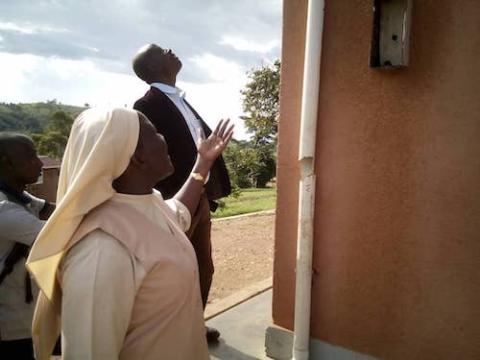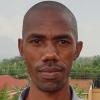
Sr. Mary Grace Akiror, right, points out some detail while inspecting government projects in western Uganda. (Gerald Matembu)
Corruption is a problem affecting national economies the world over, and Uganda is not an exception. The vice has seen funds meant for social services sidetracked into the pockets of individuals.
Fighting corruption using Uganda's current legal framework has not yielded much. So to supplement the existing legal system, President Yoweri Museveni set up a special unit in 2018 within the State House to fight corruption. Uganda's head of state further led an anti-corruption walk in December 2019, during which he described corrupt officials as parasites. On the streets of Kampala, roads were closed for thousands to march.
Museveni's search for allies against graft led him to hand-pick Sr. Mary Grace Akiror of the Little Sisters of St. Francis, a teacher at the time, to assist him in the fight, first as an assistant to the president and later as a commissioner in the office of the president, a job she still holds.
"I was surprised and equally happy because I'm passionate about fighting for the rights of the disadvantaged," she said. "I really can't tell what captured the president's eye — maybe it was destiny — because he moves a lot, and he meets many people. He wanted a person who could end corruption."
Akiror travels the East African country to respond to corruption alerts and to check on the implementation of government projects.
"My first assignment was to monitor funding which goes to the poor farmers. I derive a lot of joy in serving people in the rural areas. I put on gumboots and go in the villages," she said. "Our role is to monitor the programs being implemented and rid it of corruption."
Advertisement
As a result, Uganda has improved in the fight against graft. Transparency International's 2019 Corruption Perceptions Index ranked Uganda at 137th out of 180 countries, up from 149th in 2018.
Museveni has awarded Akiror with new roles for successfully tackling corruption in the country.
"The president has given me another responsibility to monitor local officials during COVID-19. My role is to ensure that they adhere to the president's directives and to ensure that the underprivileged have access to health services during the lockdown," she said.
GSR: Please tell us about your journey to the State House.
Akiror: One day, when I was attending a national function, the president picked me to say an opening prayer, and thereafter, he told his secretary to note my [contact] details. Months later, I received a phone call from the president, inviting me to his home in Kisozi, a settlement in the Gomba District in the Central Region of Uganda.
When I visited him at his home, the head of state told me there was some work he wanted me to help him with as I pursued my studies at the university. At the time, I had enrolled for my first degree, and the church was paying my tuition. I was immediately put on State House scholarship, and the government paid for my postgraduate diploma and master's degree in human resource management.
Tell us about your experience working at the State House.
One thing I have noticed that hurts me a lot is that the government is doing a lot for the people, but the money is pocketed by a few either at the top level or at the district or regional level. There is no fairness at all.
It's challenging to fight corruption because people act with a lot of impunity. When the head of state learns of it, he acts. But what is so challenging is that a lot does not reach him. When you send a report, it disappears somewhere along the way, and it does not reach him.

Sr. Mary Grace Akiror questions Lt. Col. James Mwesigye, the Mbarara District resident district commissioner, on the progress of government programs and corruption-related issues. (Gerald Matembu)
Is there any success story in your endeavor?
I have really fought corruption with passion. Many corrupt officials have been interdicted, and some are still facing charges in court. For example, I recently caused the arrest of some people in Ibanda, a town in western Uganda, where some contractors were conniving to do shoddy construction work on a school latrine so that they could pocket free money. I forced them to redo the work because the latrine had big cracks.
When I caused interdictions in Ibanda, government officials across the country panicked, and I overheard people wondering, "Where did the president get this sister, the sister you cannot bribe?"
Do you sometimes feel insecure doing that job?
It is very challenging and a bit dangerous, but the truth has to be told. Someone has to take a step. Even Jesus, the one we follow, wasn't crucified because he did something wrong. It is because he was talking about some of these things. I have not been confronted by anyone, but I must admit it is very challenging and also very risky. I will shake the few I can shake. The rest I will leave to God.
How did your fellow sisters receive your appointment to the State House?
My superiors discouraged me from working for the government. They threatened to dismiss me from the congregation because of my decision to work with the president. They wrote letters to me, threatening and discouraging me. At some point, they reported the matter to the apostolic legate [the pope's country representative], but he saw no problem with me working for the government. So it calmed down.

Sr. Mary Grace Akiror looks at a broken pipe during an inspection of a government project in western Uganda. (Gerald Matembu)
What is your experience working outside the church setting?
I see things differently. I can do good public speaking, which my fellow sisters cannot do. I address huge crowds and interact with people in various villages across the country during my work tour. Even as I move around, there are good projects I see elsewhere, and I have to pick people to train my women in my hometown of Ngora in the eastern Uganda to also make similar projects to improve their livelihood.
My experience and exposure is enormous. I don't regret working for the government, and even when I leave, I will leave satisfied.
However, I have not left the church. I am still working for the church as a religious, only I am working directly with government. The church has benefited a lot through my office.
How do you describe the plight of sisters in your country who are not as privileged as yourself?
The church should open up. I believe that you can serve the community better when you are placed somewhere, when you have a voice.
Some of our superiors have it planted in them that sisters have to operate within the church boundaries. There are many sisters out there who can do a lot for the community, but they are bound by the church restrictions. At some point, the president gave me a go-ahead to get another sister to join me, but the superiors declined.
The church needs to read the signs of the times. What was there before may not be applicable today. The understanding of the girls they used to get in the past is different from the understanding of the girls today that will have to join religious life. Previously, girls obeyed without question, but these days, people question, and they need answers. So those are the challenges that many congregations must face because the caliber of sisters that congregations have today must have an exposure that many things have changed in the education field. It is not like what was there in the past.

Sr. Mary Grace Akiror counsels prisoners in Sheema District in western Uganda, where she had gone to monitor the progress of prison construction. (Gerald Matembu)
[Gerald Matembu is a multimedia journalist based in Mbale Town, Eastern Uganda.]






